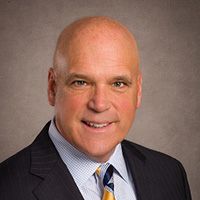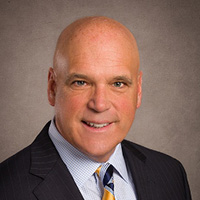Surprise, You Can Retire Now!
Many baby boomers do not realize that they have already passed the retirement threshold, but they have trouble transitioning their mindset from wealth accumulation to personal fulfillment.

Profit and prosper with the best of Kiplinger's advice on investing, taxes, retirement, personal finance and much more. Delivered daily. Enter your email in the box and click Sign Me Up.
You are now subscribed
Your newsletter sign-up was successful
Want to add more newsletters?

Delivered daily
Kiplinger Today
Profit and prosper with the best of Kiplinger's advice on investing, taxes, retirement, personal finance and much more delivered daily. Smart money moves start here.

Sent five days a week
Kiplinger A Step Ahead
Get practical help to make better financial decisions in your everyday life, from spending to savings on top deals.

Delivered daily
Kiplinger Closing Bell
Get today's biggest financial and investing headlines delivered to your inbox every day the U.S. stock market is open.

Sent twice a week
Kiplinger Adviser Intel
Financial pros across the country share best practices and fresh tactics to preserve and grow your wealth.

Delivered weekly
Kiplinger Tax Tips
Trim your federal and state tax bills with practical tax-planning and tax-cutting strategies.

Sent twice a week
Kiplinger Retirement Tips
Your twice-a-week guide to planning and enjoying a financially secure and richly rewarding retirement

Sent bimonthly.
Kiplinger Adviser Angle
Insights for advisers, wealth managers and other financial professionals.

Sent twice a week
Kiplinger Investing Weekly
Your twice-a-week roundup of promising stocks, funds, companies and industries you should consider, ones you should avoid, and why.

Sent weekly for six weeks
Kiplinger Invest for Retirement
Your step-by-step six-part series on how to invest for retirement, from devising a successful strategy to exactly which investments to choose.
As a financial adviser, I regularly encounter people who believe they are still several years away from retirement. They are shocked when, after a careful review of their accounts, I tell them that they have sufficient funds to retire today. It’s a privilege to be able to inform a client who has spent a lifetime working to reach this moment that it has arrived. I tell them, “You did it. You won.”
However, just because you’re financially ready to retire doesn’t mean you’re mentally ready. People who have spent their entire lives accumulating wealth have also spent their whole lives training a mindset associated with frugality. How is someone who has scrimped and saved for four or five decades going to change the way they view and utilize their assets?
It is a difficult transition into a different mindset and lifestyle, and a process that takes no less time and effort to execute properly than when one was saving money.
From just $107.88 $24.99 for Kiplinger Personal Finance
Become a smarter, better informed investor. Subscribe from just $107.88 $24.99, plus get up to 4 Special Issues

Sign up for Kiplinger’s Free Newsletters
Profit and prosper with the best of expert advice on investing, taxes, retirement, personal finance and more - straight to your e-mail.
Profit and prosper with the best of expert advice - straight to your e-mail.
To make the leap, focus on your goals
The most difficult mental adjustment for clients who are ready to retire is from thinking far in the future to thinking of themselves in the present. The first—and perhaps most important—question for them to ask themselves is: “What have you always wanted to do?” An even better question might be, “What drove you to work so hard, and for so long?”
For those who are unsure of what is next after retirement, I discuss their options and opportunities early on in their planning process to help clients develop a clearer vision of what is next for them. I’ve found that showing clients where their income is coming from in retirement is useful for people to understand how to finance a life that no longer involves working.
Even though new retirees may have had to abate their more luxurious desires during decades of work, many will have a very clear vision of why they did so. Perhaps to support their family, to pay off their house or to fund their children's college tuition.
Simply verbalizing these essential goals and realizing that they have now accomplished them tends to lift their burden of responsibility, allowing them to begin accepting the idea that their work might be finished and to establish a life outside of that.
From work to retirement
Now, of course, the decision whether to further pursue one’s career can be quite personal. However, if they feel as if they would like to retire at this time, that is another mindset shift they will need to make.
After decades of pursuing a career, it can feel intimidating to stop working altogether. If this feeling is especially daunting to someone who derives a lot of their identity from their careers, I would recommend taking a more gradual separation from working full-time. Opportunities to incorporate part of this work identity could be working part-time or volunteering.
Another option is encouraging a client to mentally shift their work-life balance attitude in advance to focus more on hobbies, family or travel, which helps them to more positively accept retirement. Everyone needs to get in the mindset that life doesn’t stop when you retire.
Becoming spenders rather than savers
People also encounter other mental transitions when they enter retirement—becoming a spender after always trying to save their income. Although a retiree is not receiving a paycheck from an employer anymore, I like to re-create a paycheck in a way for my clients from existing assets. That goes a long way psychologically. This flow of income should be spent, too.
For clients who were so set on saving, I advocate for them to spend more than they previously would be comfortable with because they worked hard to get to retirement. Once a new budget is established, I recommend they spend in their new means, because people deserve to enjoy their retirement.
Enjoy retirement... but not too much
Once a client has accepted that they no longer need to worry about essential responsibilities that previously drove them to continue working, it is important for them to discover what they would like to have or like to do going forward.
Perhaps after retirement, they always wanted a particular car, better clothing, a house expansion or even a second home in a nicer area with better weather. It is time to set these plans in motion to ensure that they live the happy life they had always envisioned for themselves and the one they worked so hard for.
More importantly, clients must understand that their “job” now is to ensure the prudent and enjoyable use of their accumulated funds.
A helping hand at the finish line
A financial adviser is not meant to just serve as a wealth of information for clients interested in improving their financial future. On the most rudimentary level, an adviser is a human being trying to help other human beings to become happy and prosper in the world through financial guidance.
Retirees who navigate this journey, especially those who cross the finish line called retirement, know the importance of getting help along the way. By working with a trusted adviser, retirees can deviate from a mindset of "going without" to connecting with their deepest wants and desires.
In this way, they can finally begin to live the retirement lifestyle they’ve always imagined.
Jeff Bush is an investment adviser representatives of, and securities and advisory services are offered through, USA Financial Securities Corp., Member FINRA/SIPC. www.finra.org A Registered Investment Adviser located at 6020 E. Fulton St., Ada, MI 49301. Informed Family Financial Services is not affiliated with USA Financial Securities.
Profit and prosper with the best of Kiplinger's advice on investing, taxes, retirement, personal finance and much more. Delivered daily. Enter your email in the box and click Sign Me Up.

Jeffrey E. Bush is the Managing Partner and Chief Operating Officer of Informed Family Financial Services and has been dedicated to providing high-quality service to his clients since 1994. Jeff received his MBA in Finance from St. Joseph's University and graduated magna cum laude from Alvernia University majoring in Business Management. He holds professional licenses, which include Series 6, 7, 63, and 65.
-
 Quiz: Do You Know How to Avoid the "Medigap Trap?"
Quiz: Do You Know How to Avoid the "Medigap Trap?"Quiz Test your basic knowledge of the "Medigap Trap" in our quick quiz.
-
 5 Top Tax-Efficient Mutual Funds for Smarter Investing
5 Top Tax-Efficient Mutual Funds for Smarter InvestingMutual funds are many things, but "tax-friendly" usually isn't one of them. These are the exceptions.
-
 AI Sparks Existential Crisis for Software Stocks
AI Sparks Existential Crisis for Software StocksThe Kiplinger Letter Fears that SaaS subscription software could be rendered obsolete by artificial intelligence make investors jittery.
-
 Social Security Break-Even Math Is Helpful, But Don't Let It Dictate When You'll File
Social Security Break-Even Math Is Helpful, But Don't Let It Dictate When You'll FileYour Social Security break-even age tells you how long you'd need to live for delaying to pay off, but shouldn't be the sole basis for deciding when to claim.
-
 I'm an Opportunity Zone Pro: This Is How to Deliver Roth-Like Tax-Free Growth (Without Contribution Limits)
I'm an Opportunity Zone Pro: This Is How to Deliver Roth-Like Tax-Free Growth (Without Contribution Limits)Investors who combine Roth IRAs, the gold standard of tax-free savings, with qualified opportunity funds could enjoy decades of tax-free growth.
-
 One of the Most Powerful Wealth-Building Moves a Woman Can Make: A Midcareer Pivot
One of the Most Powerful Wealth-Building Moves a Woman Can Make: A Midcareer PivotIf it feels like you can't sustain what you're doing for the next 20 years, it's time for an honest look at what's draining you and what energizes you.
-
 I'm a Wealth Adviser Obsessed With Mahjong: Here Are 8 Ways It Can Teach Us How to Manage Our Money
I'm a Wealth Adviser Obsessed With Mahjong: Here Are 8 Ways It Can Teach Us How to Manage Our MoneyThis increasingly popular Chinese game can teach us not only how to help manage our money but also how important it is to connect with other people.
-
 Looking for a Financial Book That Won't Put Your Young Adult to Sleep? This One Makes 'Cents'
Looking for a Financial Book That Won't Put Your Young Adult to Sleep? This One Makes 'Cents'"Wealth Your Way" by Cosmo DeStefano offers a highly accessible guide for young adults and their parents on building wealth through simple, consistent habits.
-
 Global Uncertainty Has Investors Running Scared: This Is How Advisers Can Reassure Them
Global Uncertainty Has Investors Running Scared: This Is How Advisers Can Reassure ThemHow can advisers reassure clients nervous about their plans in an increasingly complex and rapidly changing world? This conversational framework provides the key.
-
 I'm a Real Estate Investing Pro: This Is How to Use 1031 Exchanges to Scale Up Your Real Estate Empire
I'm a Real Estate Investing Pro: This Is How to Use 1031 Exchanges to Scale Up Your Real Estate EmpireSmall rental properties can be excellent investments, but you can use 1031 exchanges to transition to commercial real estate for bigger wealth-building.
-
 Should You Jump on the Roth Conversion Bandwagon? A Financial Adviser Weighs In
Should You Jump on the Roth Conversion Bandwagon? A Financial Adviser Weighs InRoth conversions are all the rage, but what works well for one household can cause financial strain for another. This is what you should consider before moving ahead.